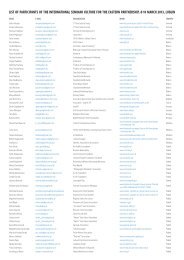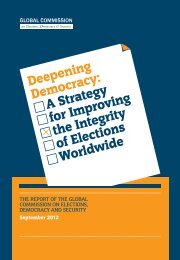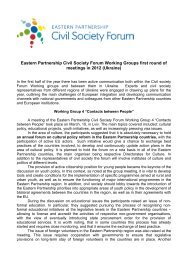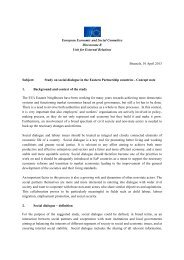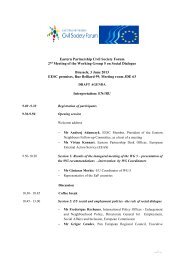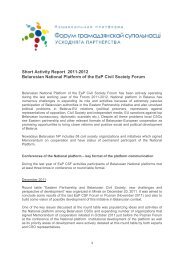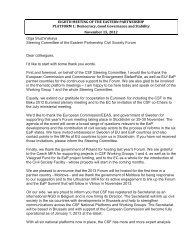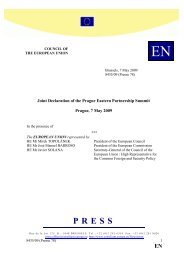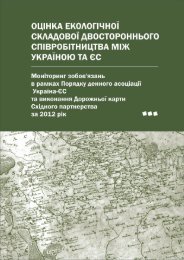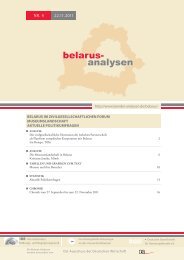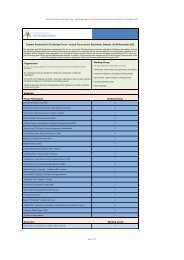Non-formal education - Eastern Partnership Civil Society Forum
Non-formal education - Eastern Partnership Civil Society Forum
Non-formal education - Eastern Partnership Civil Society Forum
Create successful ePaper yourself
Turn your PDF publications into a flip-book with our unique Google optimized e-Paper software.
1. The recognition of the concept of an additional (non-<strong>formal</strong>) and prolonged or continuous<br />
<strong>education</strong> as a legal category;<br />
2. Identification and separation of the role and powers of the various artists (schools, other<br />
organizations and individuals conducting the training, the social partners, government agencies, etc.) in<br />
the field of continuous <strong>education</strong>;<br />
3. Determination of rights and the principles of state policy in the field of continuous <strong>education</strong>;<br />
4. Defining principles of financing and building infrastructure, providing continuous <strong>education</strong>;<br />
5. The introduction of assessment and recognition of non-<strong>formal</strong> and in<strong>formal</strong> <strong>education</strong>;<br />
6. The adoption of legislation on the use of social partnership and motivation;<br />
7. Providing the highest level of predictability and control of areas without restriction freedoms<br />
defined by the RA legislation for actors in the field;<br />
8. Organization of retraining in order to improve and enhance the professional skills of specialists<br />
departments, <strong>education</strong>al institutions and other stakeholders. Providing information about the processes<br />
available in the continuous <strong>education</strong>, opportunity and efficiency required for analysis, planning,<br />
organizing, and the scope of regulation;<br />
9. The development of the pilot program (approach to accessibility extended <strong>education</strong> for those at<br />
risk and their involvement in the current <strong>education</strong>al programs), based on the results of research;<br />
10. Raising the efficiency of processes for continuous <strong>education</strong> through modern technology;<br />
11. Providing a high quality of all forms of continuous <strong>education</strong> and meeting the personal and<br />
professional needs of individuals in training. Capacity building in the strategy of non-<strong>formal</strong> <strong>education</strong><br />
and lifelong learning.<br />
Promotion of international cooperation in the field of non-<strong>formal</strong> <strong>education</strong> should be carried out in<br />
the following directions.<br />
1. Exchange programs for specialists from NFE in the field of <strong>education</strong>, the organization of exchange<br />
of experience in a variety of activities (professional conferences, seminars, etc.).<br />
2. Organization of international activities of non-<strong>formal</strong> <strong>education</strong> and maintenance of public<br />
initiatives in this field.<br />
3. Presentation of the international community of experience in the field of non-<strong>formal</strong> <strong>education</strong> in<br />
the RA study and dissemination of international experience in the field of non-<strong>formal</strong> <strong>education</strong>.<br />
Main activities<br />
1. Development Program of Action for 2008-2013 aimed at developing of non-<strong>formal</strong> <strong>education</strong><br />
by the authorized body of the Government of Armenia, together with public organizations (with their<br />
consent) and gaining for approval from the Government of the Republic of Armenia before the end of<br />
the fourth quarter of 2007, guided by the concept.<br />
2. Expected changes in the legislation to effectively address the problems associated with the use<br />
of this form of <strong>education</strong>.<br />
3. Organization of activities aimed at raising awareness for increasing the availability and distribution<br />
of non-<strong>formal</strong> <strong>education</strong>.<br />
Features of non-<strong>formal</strong> eduucation in the republic of Armenia<br />
The main strategic objective of further and continuous <strong>education</strong> in the Republic of Armenia (RA) is<br />
to define the basic principles of fairness continuous training of citizens, as well as the mechanisms of its<br />
organization, implementation, management, financing and quality assurance, which later will be served<br />
as a basis for legal regulation and practice.<br />
Some of the concepts and strategies that have been approved by the Government of the Republic<br />
of Armenia suggest new approaches to the content and amounts of additional <strong>education</strong>.<br />
The most noteworthy are “Strategy of Primary (Vocational) and Vocational Education and Training<br />
in the Republic of Armenia” (2004), “Strategy and the Concept of Adult Education” (2005), “The concept<br />
of non-<strong>formal</strong> <strong>education</strong> in RA” (2006), “RA Concept of lifelong learning “(2009), “State Program for<br />
19



